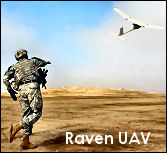 Henderson Chua, a resident of the Philippines who was arrested when he traveled to Los Angeles in February, was indicted on March 10 on charges that he illegally engaged in a temporary import into the United States of parts for an AeroVironment RQ-11 Raven drone without the required State Department license. Mr. Chua had listed the Raven on eBay, which had attracted the attention of undercover federal agents in both California and in Florida. Agents in both states had entered into discussions with Mr. Chua to purchase the parts.
Henderson Chua, a resident of the Philippines who was arrested when he traveled to Los Angeles in February, was indicted on March 10 on charges that he illegally engaged in a temporary import into the United States of parts for an AeroVironment RQ-11 Raven drone without the required State Department license. Mr. Chua had listed the Raven on eBay, which had attracted the attention of undercover federal agents in both California and in Florida. Agents in both states had entered into discussions with Mr. Chua to purchase the parts.
According to the criminal complaint filed in the case, the parts consisted of the nose cone, fuselage, and the horizontal surface of the tail assembly, but not the main wing, the entire tale assembly, the battery or the ground control equipment. (Almost all of the press stories, such as this one, this one, this one, and this one incorrectly reported that the illegal temporary import involved the entire drone.)
It’s important to understand that only parts were involved because a permanent import of these parts is not illegal. Aircraft and drone parts are not listed on the United States Munitions Import List. They are, however, listed in Category VIII(h) of the United States Munitions List, which means they require a State Department license for temporary (as opposed to permanent) imports, i.e., imports which will be followed by an export back out of the United States. As you will see, this distinction between legal permanent imports and illegal temporary imports opens up some major holes in the government’s case.
The narrative in the criminal complaint shows that Mr. Chua initially entered into negotiations with the federal agents to sell them the Raven parts, which apparently he was doing on behalf of a third party who claimed to have bought them in a Philippines government auction. During the negotiations, the agents frequently and incorrectly indicated that the import of these parts into the U.S. would be illegal. At one point, Mr. Chua responds that it should not be a problem because he is only shipping “as a part not a whole unit [and] can be declared as a spare.” (Paragraph 17.) At this point the agents might have realized that a permanent import of the parts would not be illegal, so they told Chua, for the first time and the very next day, that they were buying the parts for someone in Russia and the parts would be immediately exported after they received them. (Paragraph 18.)
After hearing this, Mr. Chua and the owner of the parts wisely consulted lawyers to see if the parts could still be shipped. Based on that consultation, Chua told the undercovers that they would need a State Department license (Paragraph 29.) After repeated statements by the agents that they would not obtain a license, Chua told the agents that he could only sell the parts to them if they would sign an agreement stating:
The Buyer shall not export, re-export, or transfer directly or indirectly either by laws applicalbe in the customer’s own courntry or by laws of the United States of America to countries/companies developing weapons of mass destruction (WMD) and to companies/persons listed under the U.S. Department of Commerce Denied List.”
(Paragraph 39.) The agents did sign such an agreement prior to the export of the parts by Chua to them. (Paragraph 42.)
As this blog has noted again and again, a criminal export violation requires knowledge by the defendant that he or she is violating the law. This is going to be tough in this case. The defendant correctly believed that he could ship the parts to the United States until the agents said that they were going to re-export the items to Russia. At that point, Chua and his seller consulted lawyers and told the undercovers they would need State Department licenses to ship the parts. When the agents declined to get licenses, Chua determined, apparently in consultation with legal counsel, that the items could only be shipped without a license if the agents agreed not to export them from the United States. Granted the advice was a bit flawed because the agreement no to re-export was limited to countries involved in developing WMD or to parties on the Department of Commerce’s Denied Parties List. But there is not a shred of evidence that Mr. Chua didn’t believe that this advice was a correct statement of U.S. law. Chua may be liable for civil penalties under the Arms Export Control Act but criminal penalties can’t be imposed without proving he knew he was relying on bad legal advice.
 According to this Law360 post (subscription required), James Larrison, a former employee of Aegis Electronic Group, was sentenced to probation for his role in the company’s export of an EAR99 Hitachi JU72 video camera junction to Iran. Larrison pleaded guilty to the export violation in December 2009. In April 2011, Aegis entered into a deferred prosecution agreement and agreed to pay a $20,000 fine to the Office of Foreign Assets Control (“OFAC”) in connection with this export.
According to this Law360 post (subscription required), James Larrison, a former employee of Aegis Electronic Group, was sentenced to probation for his role in the company’s export of an EAR99 Hitachi JU72 video camera junction to Iran. Larrison pleaded guilty to the export violation in December 2009. In April 2011, Aegis entered into a deferred prosecution agreement and agreed to pay a $20,000 fine to the Office of Foreign Assets Control (“OFAC”) in connection with this export.
 Posted by
Posted by  Category:
Category: 

 A superseding
A superseding New-York based electronics wholesaler
New-York based electronics wholesaler  Henderson Chua, a resident of the Philippines who was arrested when he traveled to Los Angeles in February, was
Henderson Chua, a resident of the Philippines who was arrested when he traveled to Los Angeles in February, was  Notwithstanding an apparent slip-up by undercover agents in a sting which caught a Seattle-area software engineer in a plan to export ITAR-controlled radiation-hardened semiconductor chips to China, the target of the sting, Lian Yang,
Notwithstanding an apparent slip-up by undercover agents in a sting which caught a Seattle-area software engineer in a plan to export ITAR-controlled radiation-hardened semiconductor chips to China, the target of the sting, Lian Yang, 

